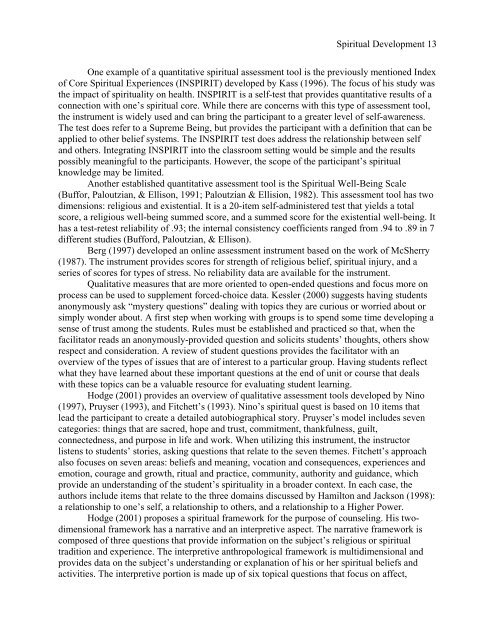The Gift of Spirituality
The Gift of Spirituality
The Gift of Spirituality
You also want an ePaper? Increase the reach of your titles
YUMPU automatically turns print PDFs into web optimized ePapers that Google loves.
Spiritual Development 11<br />
<strong>The</strong> thought for a day activity developed by Huitt (1999) is another lesson that could be<br />
used at this stage. <strong>The</strong> concept behind the thought for a day is “to demonstrate that our<br />
cultural/historical and religious backgrounds provide us with generic knowledge about how to<br />
think and behave in our modern world, and to practice learning to apply these in specific<br />
situations in our daily lives” (Huitt, p. 1). Quotations from a variety <strong>of</strong> sources, both secular and<br />
religious, can be discussed at the beginning <strong>of</strong> each day as a stimulus to encourage students to<br />
focus on developing a particular virtue or value for that day. This can be supported by<br />
discussions at home or in the community by having similar thoughts or quotations presented on<br />
billboards, on marquees, in newspapers, etc.<br />
An activity at the synthetic-conventional that can help students develop meaning and<br />
purpose is for them to complete self-focused surveys. <strong>The</strong>se can be fun while provoking the<br />
student to evaluate his or her self-knowledge. <strong>The</strong> Index <strong>of</strong> Core Spiritual Experiences<br />
(INSPIRIT) online evaluation is an excellent example (Kass, 1996). As the name indicates, this<br />
questionnaire measures the experiences <strong>of</strong> the spiritual core. In addition to the survey, students<br />
can review the spiritual boosters that are made available at the INSPIRIT website.<br />
Another assessment that can provide insight into one’s inner self is the assessment <strong>of</strong><br />
signature strengths described Seligman (2002). Seligman and his colleagues have identified 24<br />
strengths related to 6 categories <strong>of</strong> virtues found in all cultures: (1) wisdom and knowledge, (2)<br />
courage, (3) love and humanity, (4) justice, (5) temperance, and (6) spirituality and<br />
transcendence. Adult and youth versions <strong>of</strong> the assessment instrument are available.<br />
Spiritual journaling, whereby students are encouraged to write their beliefs and<br />
experiential knowledge <strong>of</strong> themselves, can be used at any stage to increase and/or document<br />
spiritual progress. Ideally, this can be done in an English or Language Arts class to afford the<br />
educator an opportunity to assess writing skills. Integrating a spiritual journal into a career class<br />
could be a technique for increasing the student’s awareness <strong>of</strong> personal tastes, views, and talents<br />
all <strong>of</strong> which are needed for making a career choice. <strong>The</strong> educator should guide the student by<br />
listing the purposes and grading criteria for the journal, providing the student with clear<br />
expectations. Questions such as, “What do you like most about yourself,” can stimulate selfreflective<br />
critical thinking while providing the educator a view <strong>of</strong> how the students see<br />
themselves. Limiting or prohibiting classroom sharing may be necessary in order to create an<br />
environment conducive to meaningful contribution in the journal.<br />
Individuative-reflective, conjunctive, and universalizing stages would normally be<br />
addressed in adulthood. However, the same concept applies. Different activities can be provided<br />
that encourage the individual to address increasingly complex issues to resolve (i.e., require<br />
increased levels <strong>of</strong> differentiation and integration). While it is important to provide opportunities<br />
for all children and youth to experience activities in all pathways, it is likely that mature adults<br />
will begin to select those pathways with which they have had some sort <strong>of</strong> positive experience. If<br />
parents and educators have done their job well, adults will be able to make their selections based<br />
on their own experiences rather than on only those promoted by their society or culture.<br />
Hopefully, this will result in the individual continuing to select activities that can impact spiritual<br />
development. If not, there is likely to be little growth beyond the mythical-literal or syntheticconventional<br />
stages <strong>of</strong> childhood and youth.<br />
All activities appropriate for use in the educational setting are meaningless if the climate<br />
is not conducive to learning. Having educators, administrators, and school boards that understand<br />
the impact a student’s spiritual status can have on the student’s ability to meet the school’s

















